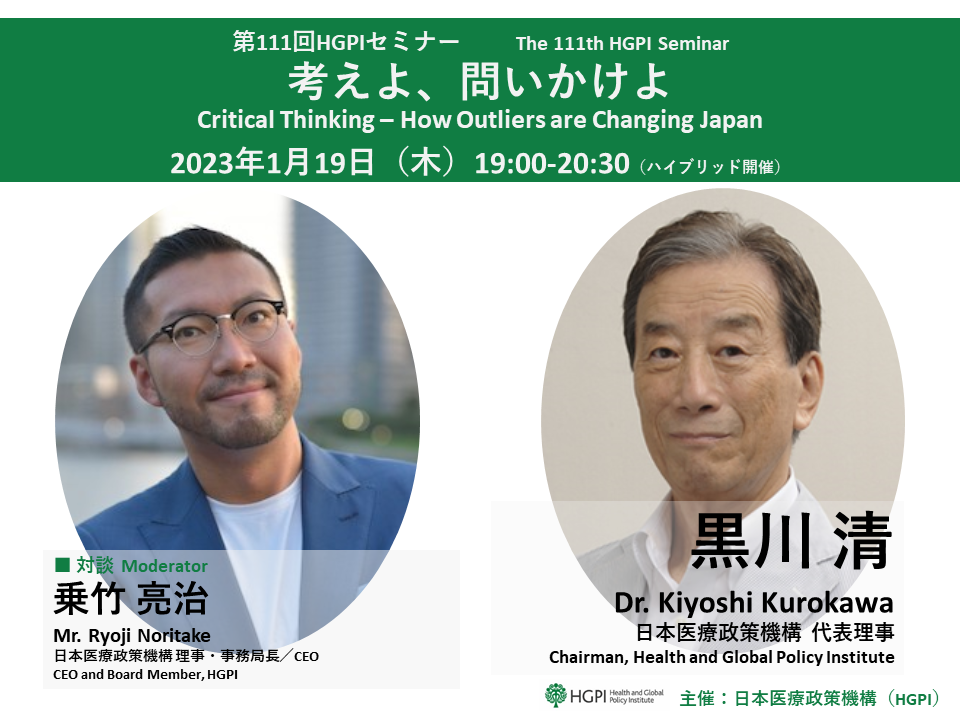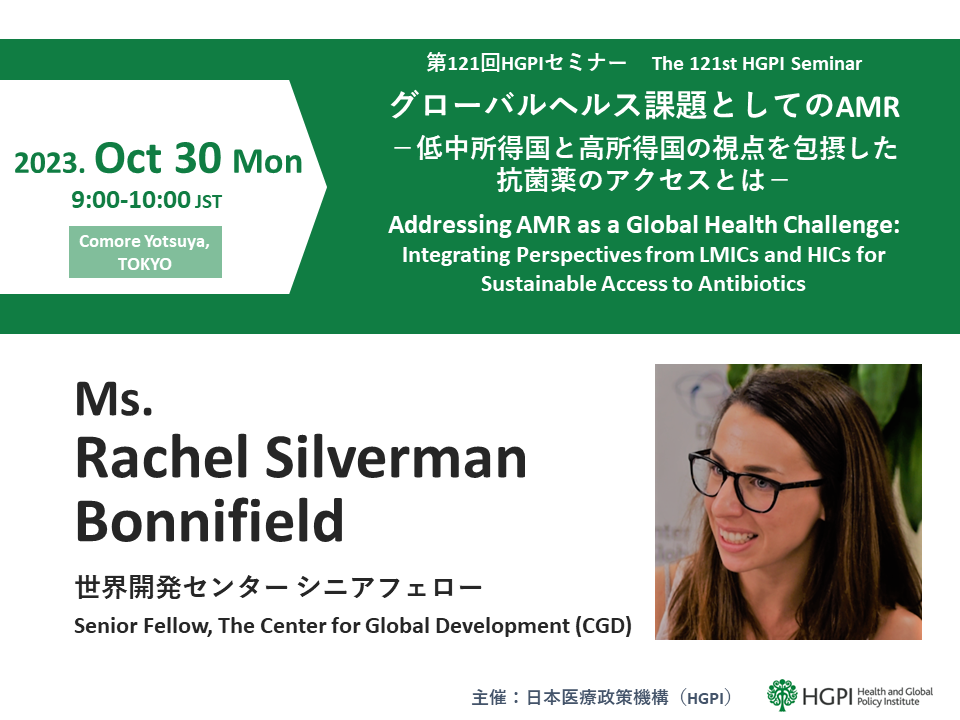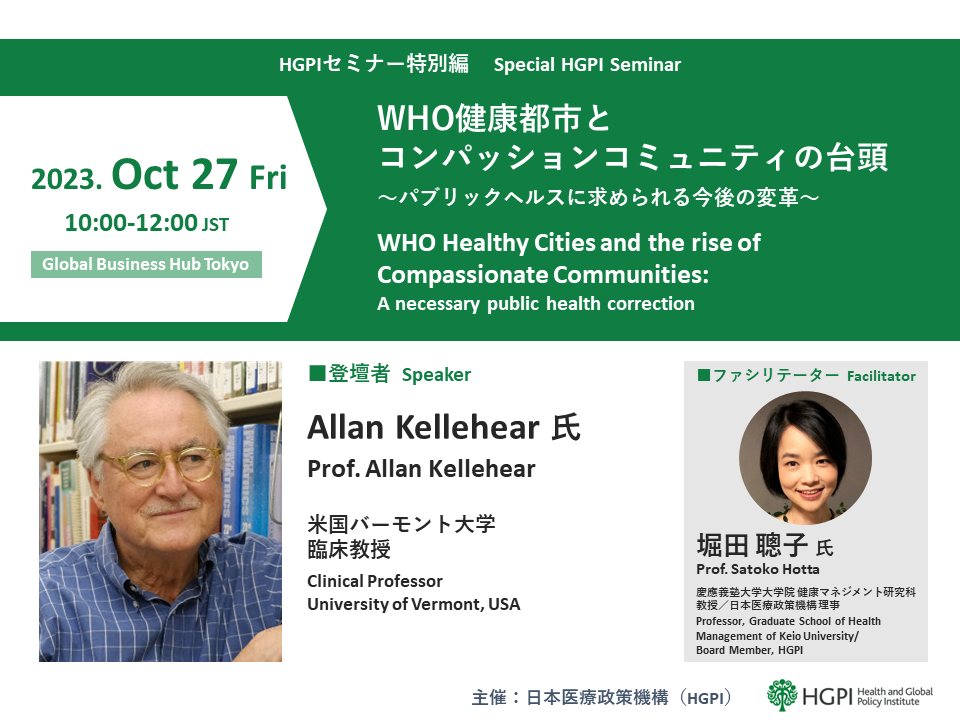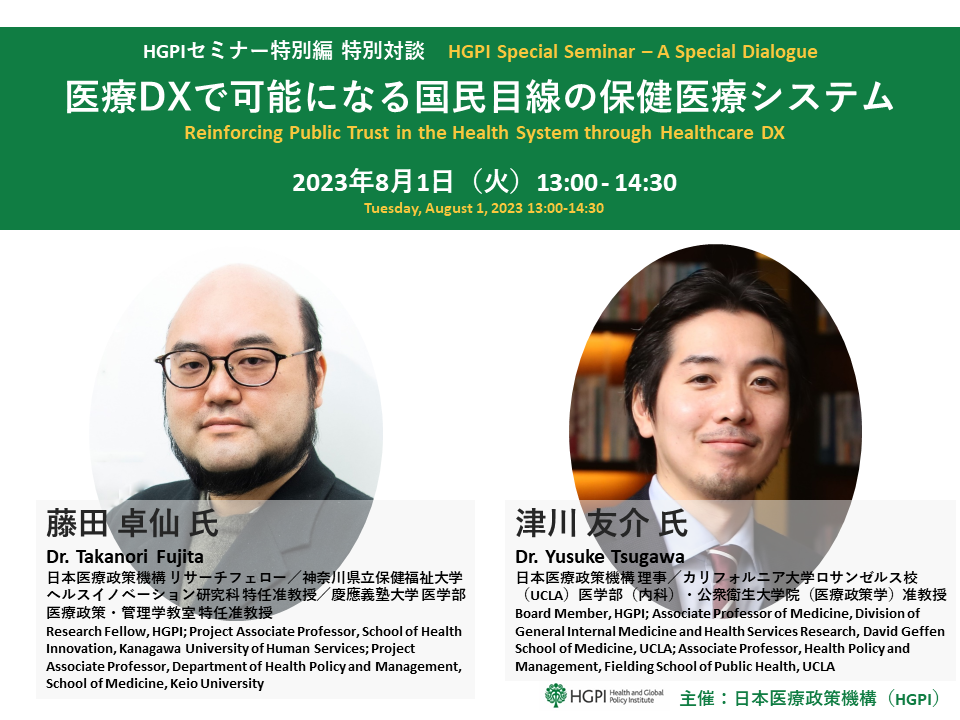[Event Report] HGPI Special Seminar “HGPI Celebrates its 20th Anniversary: Reflecting on HGPI’s Journey from the Past to the Future” (January 16, 2024)
date : 6/21/2024
Tags: HGPI Seminar
![[Event Report] HGPI Special Seminar “HGPI Celebrates its 20th Anniversary: Reflecting on HGPI’s Journey from the Past to the Future” (January 16, 2024)](https://hgpi.org/en/wp-content/uploads/sites/2/240116_HGPISeminar_eyecatch-1.png)
April 2024 marks the twentieth anniversary of the founding of Health and Global Policy Institute (HGPI). This year’s first HGPI Seminar featured a conversation among Dr. Kiyoshi Kurokawa (Chairman, HGPI), Mr. Ryoji Noritake (CEO, Board Member, HGPI) and Ms. Eri Yoshimura (Senior Manager, HGPI), who took a look back on two decades of HGPI activities.
Key points of the seminar
- Since its establishment in 2004, HGPI has pursued its mission of “achieving citizen-centered health policy,” and has contributed to policy implementation through agenda setting, shaping, and delivery.
- HGPI activities in recent years can be linked to concrete policies in various areas, starting with dementia, women’s health, and infectious disease control (particularly, antimicrobial resistance (AMR) and immunization and vaccination).
- HGPI should maintain a stance that enables it to accurately grasp the policy issues and needs of society and catalyze discussions that meet the demands of today.
HGPI’s beginnings as a laboratory at the University of Tokyo
Mr. Ryoji Noritake (hereinafter “Noritake”): HGPI was established in April 2004 as a laboratory at the University of Tokyo and was called the Tokyo Advanced Healthcare Policy Center. It was renamed to its current Japanese name in March 2005. As for our English name, at the time, it was Health Policy Institute Japan, or HPIJ. The current name, “Health and Global Policy Institute,” came later, and was changed to reflect our recognition of the need to think of health policy with a global perspective in addition to domestic health policy.
HGPI’s first policy recommendations were related to women’s health
Noritake: In May 2005, HGPI released its first policy recommendations, which focused on women’s health, a topic that was not yet receiving significant attention. Centered on topics like “the declining birthrate and women’s health” or “women’s employment and health policy,” those recommendations took a deep dive into issues that included Japan’s demographic profile. The Government of Japan later launched initiatives in this area, such as providing insurance coverage for infertility treatment and establishing workplace environments that are friendlier to women. I believe it is one duty of HGPI to shine a spotlight on latent challenges related to health at early stages, like in this example.
Staying committed is a crucial part of engaging in policy advocacy. We can look to birthrate decline and women’s health policy for examples of how continuously generating recommendations has allowed HGPI to contribute to policy progress.
HGPI’s role
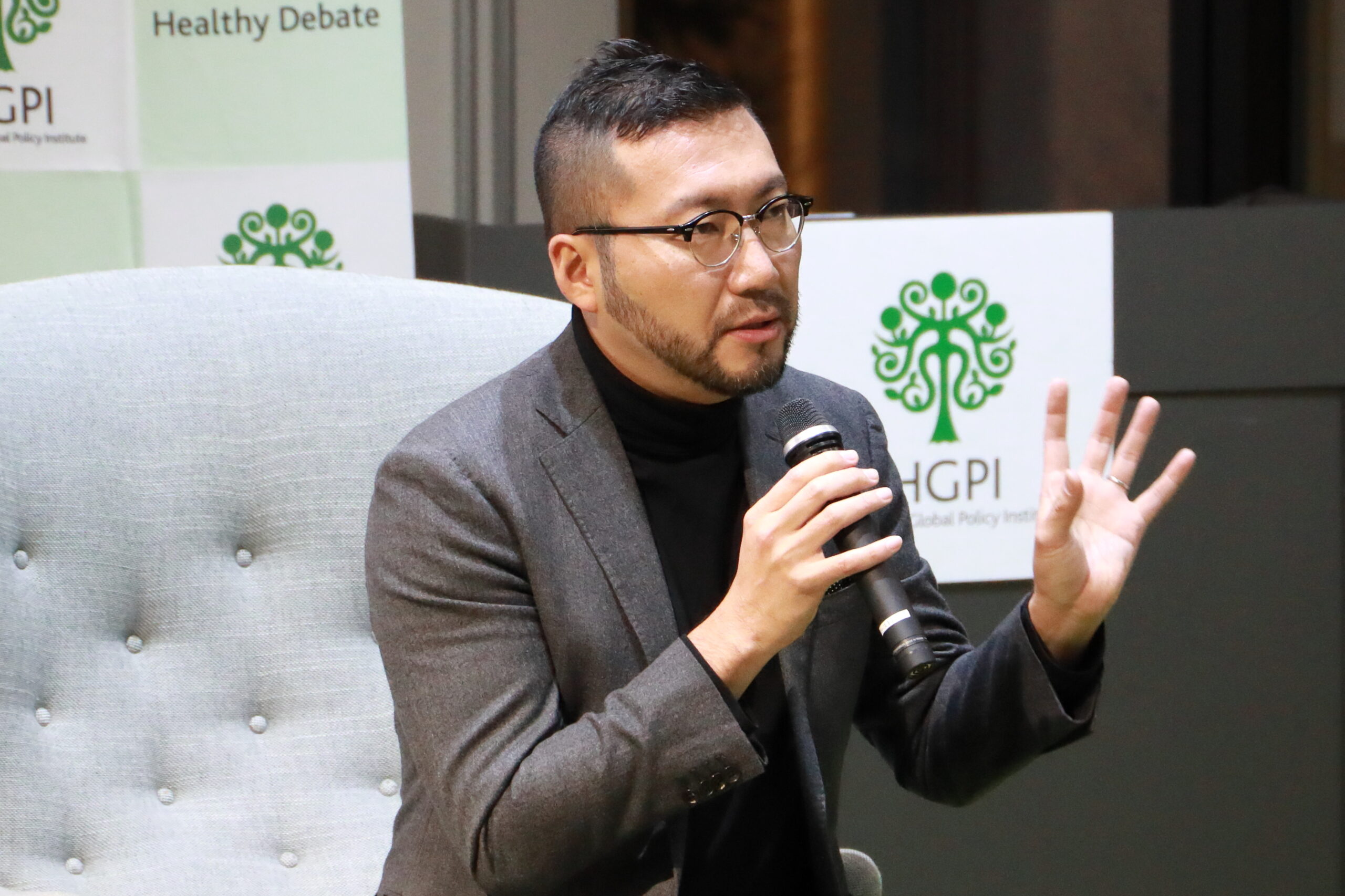
Noritake: HGPI emphasizes three points when engaging in activities for policy advocacy.
The first point is “agenda setting.” As shown in the aforementioned example of women’s health, in a world where the agenda is crowded with important topics, HGPI informs society of the issues that will require discussion in the future.
The second point is “agenda shaping.” By gathering multi-stakeholders (particularly, citizens, patients, and affected parties) on an even playing field for repeated discussions on policy, we identify true solutions to issues as well as next steps.
The third point is “agenda delivery.” In addition to compiling policy recommendations, HGPI also advocates to policymakers such as the legislature or the executive branch and continues to approach them until our recommendations are implemented in real policy. Because HGPI is a non-partisan, independent organization, we provide individual explanations to members of the Diet in a non-partisan manner. We also host study sessions for members of the Diet and hold explanatory meetings on the content of our recommendations to officials at ministries and agencies of the central Government. Recently, in areas that require a response tailored to each prefecture, such as in the fields of cardiovascular disease (CVD) or dementia, we have been hosting meetings to provide detailed explanations to administrative officials from each prefecture.
The political landscape at the time of HGPI’s establishment
Noritake: We hosted the first Health Policy Summit, which was our first large-scale panel discussion, in February 2006. This was prior to the transition to the Democratic Party of Japan (DPJ) government, and each party was presenting its manifesto on social security policy and engaging in active discussions. One highlight within HGPI’s legacy will be the fact that we were able to host an open discussion before the transition to the DPJ government, in an era before developments like the three-party agreement on integrated reform of tax and social security systems.
At the time, decision-making on social security and health policy in Japan was said to be centered on the “iron triangle” of stakeholders: politicians, bureaucrats, and interest groups. I believe it was this context which fostered the contemporary demand for think tanks to start recognizing their roles in promoting multi-stakeholder, non-partisan discussions.
HGPI advocacy activities led to policy being implemented in the area of cancer control
Noritake: In March 2006, HGPI conducted a survey among people in the field of cancer that helped shape the Cancer Control Act. However, this was not the result of our activities; it was the result of many people from cancer patient groups uniting their efforts. The Cancer Control Act was formulated in 2006, and the most significant change it introduced was that it clearly stated that people living with cancer or their family members must be included in the Government’s Cancer Control Promotion Council. This was one example of a citizen-centered health policy that HGPI advocates for, and could be called a major achievement of the Cancer Control Act.
HGPI’s main activities over its twenty-year history
Noritake: In addition to cancer control, other examples of the voices of those most affected being reflected in policy can be found in the Basic Act on CVD Measures and the Basic Act on Dementia, which was enacted last year. I think it will be necessary to continuously expand good examples such as these to adjacent areas.
Other HGPI activities have included collaborating with international patient groups and offering recommendations at the Global Health Summit. At the time, concepts like global health or international health had yet to take root in Japan, but thanks to the initiative of our Chairman, we were able to work together with the World Bank to offer recommendations on Japan’s role in global health.
HGPI has been engaged in a wide variety of other activities for many years, including hosting the Cancer Policy Summit and establishing the National Forum on Health Policy. These activities have also included conducting support recovery efforts for the Great East Japan Earthquake, establishing a forum for discussing the sustainability of the health system and healthcare services, and hosting a forum on non-communicable diseases (NCDs) in November 2011. While “NCDs” is something we often hear today, such as when topics related to health are covered in the media, in 2011, global collaboration for NCDs was rare for Japan as a whole. In November 2014, together with the Organisation for Economic Co-operation and Development (OECD), we co-hosted an event that served as a successor to the G7 Dementia Summit. Dementia was already a key topic in 2014, but it was not as prominent as it is today, so this event serves as a good example of HGPI being an early actor in setting the agenda. HGPI has also offered an introductory program on health policy called Health Policy Academy since 2015, and launched a project on antimicrobial resistance (AMR) in 2016.
As we have seen, HGPI built its reputation over the past twenty years through sustained policy recommendation activities and by establishing various alliances and other opportunities for discussions on topics like dementia, AMR, and NCDs, which are activities that we continue today.
Other HGPI activities include presenting recommendations on mental health and Coronavirus Disease 2019 (COVID-19), and hosting Health Policy Summit, which is our flagship event that is held every year. One item that we have recently been focusing on is public-private exchange. We host a Roundtable for Public-Private Opinion Exchange about once every two months, mainly when the Diet is in recess. The purpose of these meetings is to encourage interaction between the public and private sectors, because early- and mid-career bureaucrats at the Ministry of Health, Labour and Welfare (MHLW) and other ministries have busy schedules that leave little time for them to exchange opinions with the private sector or to learn more about real-world circumstances in various industries. To help overcome this issue, HGPI is taking action in its capacity as a non-profit, independent, and non-partisan organization to host private sector representatives and create opportunities for interaction with members of the public sector. The Roundtables for Public-Private Opinion Exchange cover many topics such as healthcare DX and work style reform and have earned an extremely warm reception. This is the result of the trust that is placed in HGPI and of our twenty-year legacy.
A look back on Japanese society over the past twenty years and the challenges we face
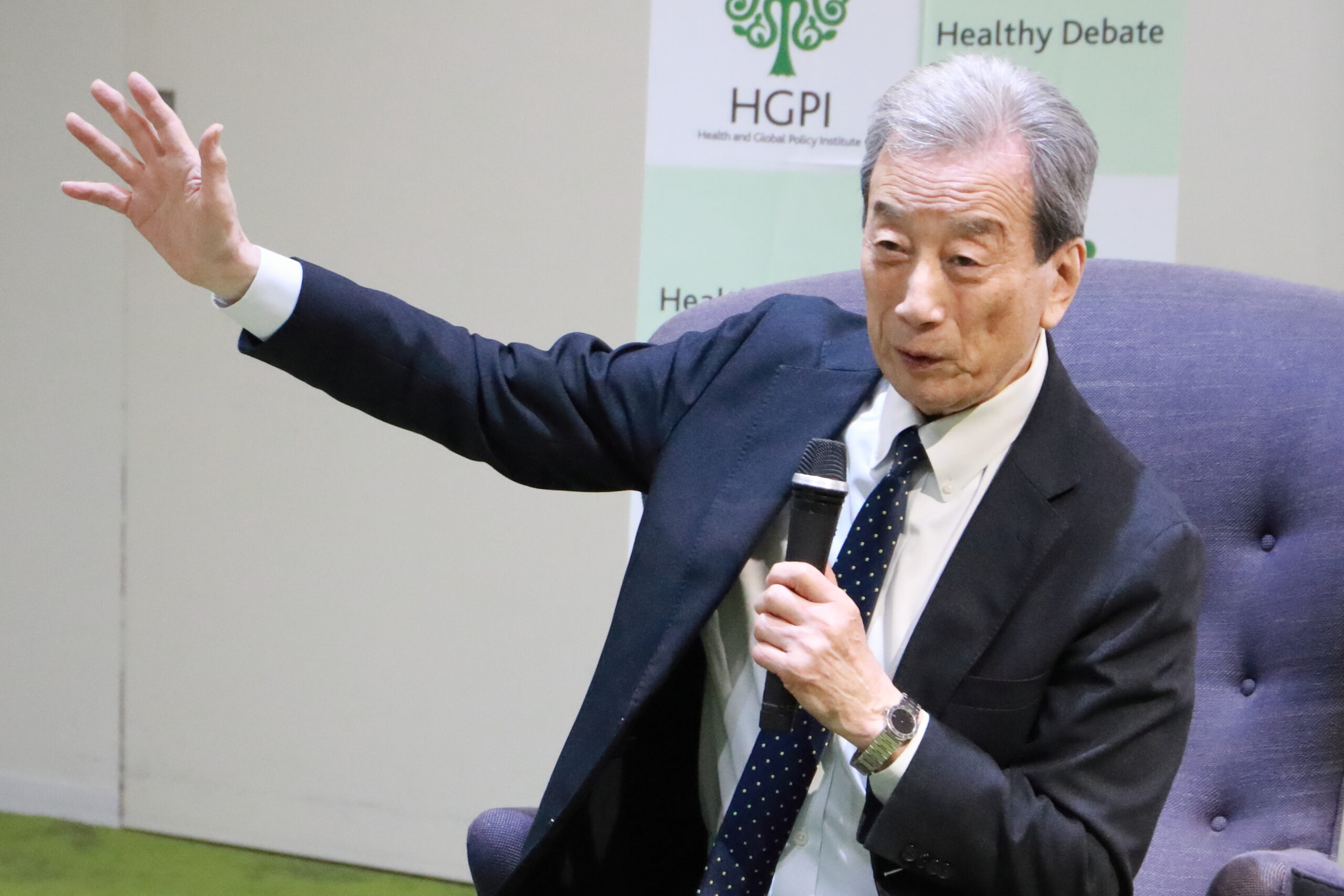
Dr. Kiyoshi Kurokawa (hereinafter, “Kurokawa”): If we compare today to twenty years ago, how does Japan fare? Japan as Number One by Ezra Vogel was published in 1979. I think the reason Vogel wrote his book was because Japan happened to be experiencing rapid economic growth, and he recognized that Japan had the potential to become number one. However, contrary to these expectations, Japan’s economy began to slow down in the mid-1980s, and we are now the only OECD member that has not experienced growth in Gross Domestic Product (GDP). We must think about what actions Japan should take in response to these circumstances.
On the topic of Japan’s lack of GDP growth, the greatest problem facing Japan is a decline in competitiveness due to the ongoing transition to a super-aging society. Japan is now home to 90,000 people who are 100 years of age or over, while the population that is age 65 years and over accounts for almost 30% of Japan’s total population. From a medium- to long-term perspective, this is the greatest risk facing Japan and will bring about a decline in competitiveness. While Japan could attract young people from overseas who can compete on a fair playing field, because Japan still has an isolationist culture, doing so is not realistic. For Japan to maintain competitiveness as the country where population aging has advanced the most, we are at a crossroads where our way forward will depend on if we choose to bring in new players from overseas and if measures to address the declining birthrate are successful.
HGPI activities in recent years
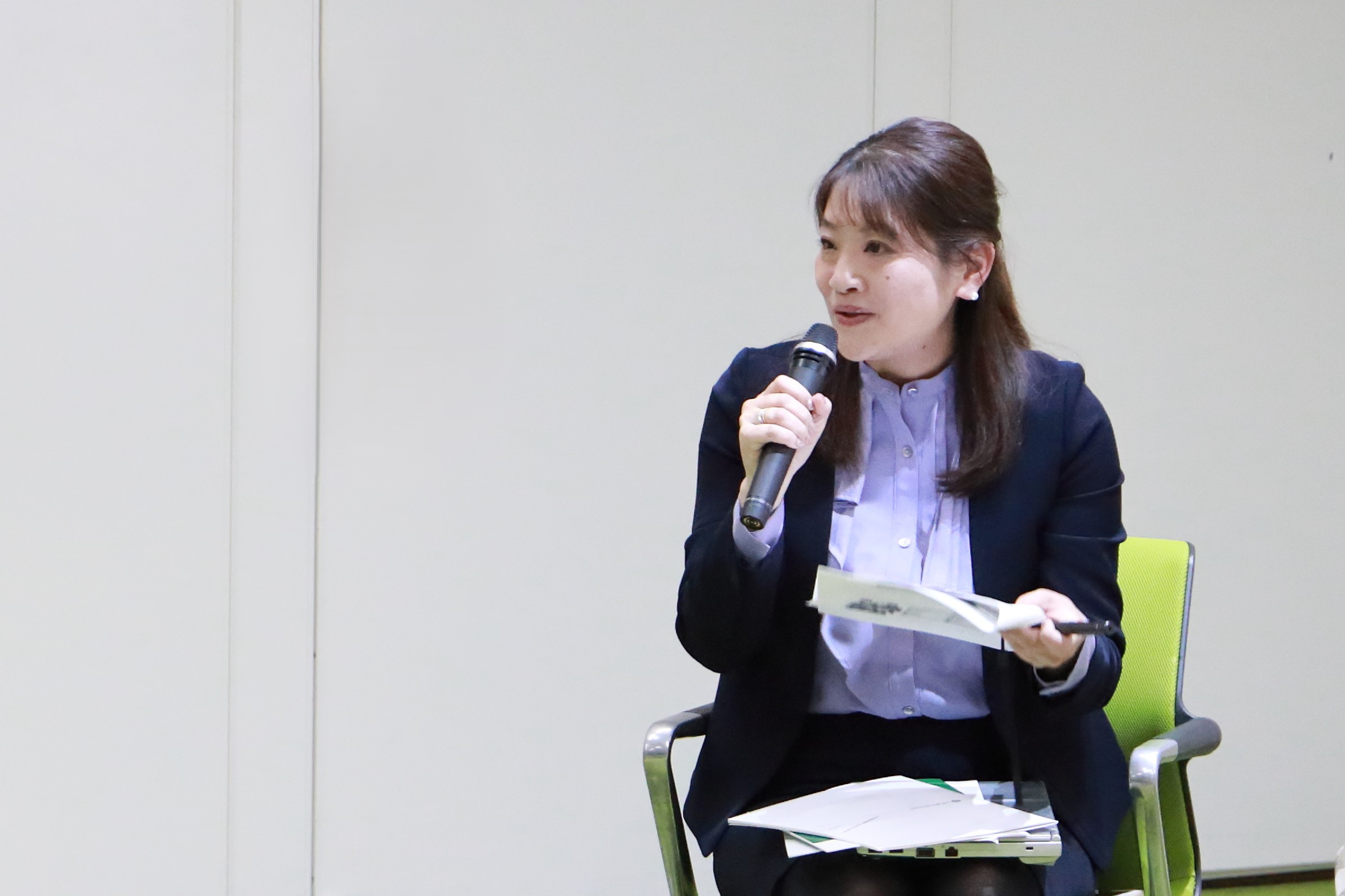
Ms. Eri Yoshimura (hereinafter, “Yoshimura”): I would like to share some details regarding the results of HGPI’s recent activities.
Measures for dementia
Yoshimura: Dementia was the focus of global attention at the 2013 G7 Summit in London. While there was not wide recognition toward the topic of dementia in Japan at the time, HGPI began its activities for dementia in 2014. As Japan is the country where population aging has advanced the most, the response that Japan develops toward dementia and an aging society is attracting attention from around the world, including from developed countries. In particular, there is a great degree of interest from the Asia-Pacific region, where rapid population aging will soon occur. With the goal of achieving an inclusive society, HGPI has continuously offered recommendations and taken other activities for measures that are based on the voices of people living with dementia and other affected parties and that span multiple government ministries and agencies. The FY2023 enactment of the Basic Act on Dementia was a significant milestone in these activities. Furthermore, from the perspective of supporting the daily lives of senior citizens, we must not overlook developments at the municipal level. Each municipality is now actively engaging in measures for dementia. As of January 2024, twenty-one municipalities have introduced local regulations for dementia and efforts to foster involvement from those most affected are also advancing.
Women’s health
Yoshimura: While efforts to promote women’s advancement were made during the first Abe administration, discussions on issues related to women’s health have been insufficient. Given this context, HGPI presented the “Survey on Health Promotion and Working Women 2018,” which quantified and visualized the relationship between health issues and labor productivity for working women. For example, we found that performance at work or school drops by half when women experience menopausal or menstrual symptoms. Since then, we have conducted a number of surveys that have emphasized that women’s health issues are socioeconomic issues rather than individual ones. We have also engaged in activities aiming to improve literacy for women’s health.
Findings from HPGI’s 2018 survey are being reflected in the conditions used to determine Health and Productivity Management scores by the Ministry of Economy, Trade and Industry (METI). With a number of recent developments such as changes in medical service fee reimbursements, the establishment of a federation at the LDP, the start of sales of emergency contraceptive pills, and the establishment of a national center specializing in women’s health at the National Center for Child Health and Development, it is safe to say that in the past few years, women’s health has been an area that has seen progress in policy as well as major changes in society.
Infectious disease control (AMR, immunization, vaccinations, etc.)
Yoshimura: For many years, HGPI has been taking action to contribute to the fight against AMR. In 2015, the World Health Organization (WHO) urged each country to create a national action plan on AMR within two years. When the Government of Japan formulated its action plan in April 2016, HGPI was early to act by arranging discussions with the U.S. Center for Strategic and International Studies (CSIS). Based on the belief that we should take stronger action for AMR, HGPI has engaged in a variety of activities since then, including the launch of AMR Alliance Japan in 2019. AMR Alliance Japan has undertaken various activities for AMR from a position of neutrality and together with multi-stakeholders, centered on academia and pharmaceutical companies.
AMR Alliance Japan has established seven main themes and they have led to policy outcomes. The National Action Plan on AMR (NAP) was formulated in 2016, which was also the year that the G7 Summit was held in Japan. The G7 Summit was held in Japan once again in 2023, which was also the year that the NAP was revised, so it is safe to say that Japan’s AMR measures and the G7 are closely related. In addition, the promotion of measures against AMR has been included in the Basic Policy on Economic and Fiscal Management and Reform for many years. The impact of COVID-19 resulted in measures against AMR being left out of the draft of the Basic Policy in 2021, but activities from AMR Alliance Japan resulted in it being added back in.
HGPI also has a history of activity in the area of immunization and vaccination. While there is a strong impression that vaccines are something that is given to children, HGPI believes that vaccinations should be encouraged over the life course. This includes adult vaccinations. Vaccine hesitancy was also recognized as a problem during the COVID-19 pandemic. During that time, HGPI conducted a cultural anthropological study among people who decline vaccinations for reasons such as religion, their beliefs, or psychological factors.
HGPI has also been an early actor on a number of other themes including developing human resources in global health; planetary health; and the relationship between climate change and health.
Involvement for patients and other people with lived experience
Noritake: The real significance of achieving citizen- and patient-centered health policy, which is HGPI’s mission that we have held close to our hearts since our establishment, is that centering health policy on those parties makes it possible to see policy issues that only those most affected are aware of. For example, people living with cancer or who have experienced cancer wish to avoid losing their jobs due to cancer, want employment support, and want to live in a society that allows them to continue working even with cancer. However, physicians providing cancer treatment are not always fully aware of these desires. I think it is because they live alongside cancer every day that people living with cancer are aware of these issues in their daily lives. In recent years, within domestic progress in palliative care, there have been policy changes in pain care and pain control that occurred as a result of activities from patient groups. There are examples of measures to provide employment support being established for people with cancer, and there are similar discussions being held in the fields of dementia and CVD control. As we can see, there is ongoing demand for cross-cutting perspectives that span multiple disease areas from people with lived experience and healthcare service users.
NCD control
Yoshimura: HGPI has also engaged in activities for individual diseases like cancer, chronic pain, CVDs, chronic kidney disease, and obesity, and we think those efforts contributed to the enactment of laws as well as to government committees and other discussion forums. HGPI is also active in the field of mental health, which we see as an area where policy has been particularly lacking in reflecting the perspectives of those most affected.
Efforts to assess innovation and cost-effectiveness or to promote healthcare DX
Yoshimura: Starting in 2016, we have hosted a series of discussions on topics such as the future of the health system, the drug pricing system, and cost-effectiveness analysis. We also had the opportunity to serve on the Expert Panel on Comprehensive Measures for Prompt and Stable Supply of Pharmaceuticals as a representative of civil society.
The impact of COVID-19 led some people to conclude that Japan’s health system needs an overhaul. In response, a project on reviewing global health systems was launched and is currently being operated through joint efforts from HGPI, Keio University, and the London School of Economics.
As for the topic of healthcare DX, recognizing that there are some areas where Japan still lags behind, HGPI aims to identify methods that citizens can use to share data and the benefits they will obtain from healthcare DX.
Kurokawa: While this is from a slightly different perspective, on the topic of dementia, one challenge is the difficulty in diagnosing dementia in its early stages. We believe that methods utilizing digital technology and not biology will be useful in diagnosing dementia.
Noritake: As mentioned by Dr. Kurokawa, when we look back on HGPI’s activities over the past twenty years, we can see increased involvement from stakeholders who have not traditionally been involved in health policy in our network as well as in the content of our activities and policy recommendations. This includes the area of healthcare DX. One expression used in pharmaceuticals is “Beyond-The-Pill,” which is precisely what is meant by the expectation that by implementing policies in society that create synergy among measures or combinations of these tools, modern society can achieve effects greater than those that can be achieved through pharmaceutical use alone.
Considering the ideal form of healthcare and HGPI’s position in the future in terms of trust in health information
Yoshimura: Health information has become a form of information that transcends various existing boundaries, such as national borders or social disparities. In particular, when faced with circumstances like a pandemic, there is a mixture of both good and bad information. Such circumstances require both the transmitters and receivers of information to possess literacy when handling that information. With this in mind, how should we envision the future of health information that is related to life and death?
Noritake: One necessary condition may be to engage in cross-sector collaboration to accelerate the de-medicalization of healthcare or halt the movement toward medicalization. For example, in dementia, this includes dementia-friendly design. Discussions are currently being held on how to design PET bottles to be easier to use for people living with dementia. As such discussions demonstrate, collaboration with sectors outside of healthcare is becoming more and more important. This may be related to “biopower” or “biopolitics,” which were discussed by Michel Foucault in the 1970s. Foucault thought that traditionally, sovereign power functions through a system in which people’s lives are controlled by forms of punishment. Examples of such punishments include capital punishment or imprisonment. However, he also warned us that sovereign power attempts to control the lives of the people by determining how they should live. For an example, we can look at the growing emphasis being placed on lifestyle, such as following a healthy diet or not smoking. Given the context of such philosophical arguments, we can assume that, despite the mature civil society in Europe, demonstrations in which people started fires in cities occurred during the COVID-19 pandemic as a result of government interference in citizens’ lives. This movement, which said it is irrational for the state to instruct individuals on everything from masking to lockdowns, mainly occurred in Europe.
As for information related to vaccines or health, I believe we no longer live in an era where the public can be convinced only by accurate health information provided by health professionals. I think that the ongoing transition to such an era is underway from the perspective of health information and as a paradigm in society as a whole. As such, I think that cooperating with sectors other than healthcare will be vital for the future of HGPI.
When we consider these circumstances in terms of life, aging, sickness, and death—which Buddhism views as the four inevitable aspects of existence—we see that all of society has been thinking about, caring for, and honoring these four aspects. It is also safe to say that modern society has medicalized these concepts. Expectations are high for the promotion of in-home and community care to help us transition from the era in which care was gradually centralized and hospitalized and return to an era in which it is community-based. Given the context of this trend, I believe that the future of HGPI and of healthcare is one in which we are steadfast in maintaining a suitable healthcare provision system while holding discussions that span topics including healthcare DX, the democratization of data, and the construction of databases.
Assessing HGPI’s impact on health policy
Noritake: For a long time, we have been discussing how to evaluate HGPI activities. It is difficult to evaluate our activities in terms of specific measures or policy outcomes because policies are not created through our activities alone. For example, while HGPI contributed to the enactment of the Cancer Control Act, that achievement was the result of the activities of many people, particularly those at cancer patient groups and similar organizations. Similarly, in the area of AMR, it was the efforts of many stakeholders that led to the establishment of a pull incentive system in Japan.
There is an affinity among these challenges related to evaluation and concepts such as Evidence Based Policy Making (EBPM) within the context of government. We would like to gather opinions from people with experience in these areas at private companies or in the government and consider these items together.
HGPI’s financial independence
Noritake: Next, allow me to explain HPGI’s financial independence. As of 2023, HGPI currently operates with a budget of around 234 million yen and with about thirty staff members. Our directors serve on an unpaid basis. We receive donations from around forty private companies, which we refer to as corporate members. In addition to their annual donations of 3 million yen, we also obtain individual donations from those sponsors for each project when they are implemented. For example, we are carrying out a project related to the cardiovascular system with donations from two or three companies that are interested in that field. I must note that our funding guidelines do not allow for projects to be carried out with donations from single companies; we maintain neutrality in policy recommendations by only implementing our projects with support from multiple companies. In addition, in accordance with our guidelines, our projects are only carried out after we have received written agreements from our supporters that HGPI will determine the content of policy recommendations in a neutral and independent manner.
HGPI also pays attention to sources of funding such as government grants. The major ones we have received include research funding from the Japan Agency for Medical Research and Development (AMED), the Health, Labour and Welfare Research Grants, and the Elderly Healthcare Project Promotion Subsidy. Each of these gather proposals through open calls for applications and in recent years, they have made up as much as around 10% of our total budget. This has helped HGPI maintain its independence and neutrality. Around the world, when evaluating neutrality, emphasis is placed on maintaining neutrality and independence from the national Government, and HGPI is working to stay independent and neutral in that regard, as well.
Moving forward, HGPI will continue working to achieve citizen-centered health policy while maintaining its independence.
[Overview]
- Speakers:
– Kiyoshi Kurokawa (Chairman, HGPI)
– Ryoji Noritake (CEO and Board Member, HGPI)
– Eri Yoshimura (Senior Manager, HGPI)
- Date & time: Tuesday, January 16, 2024; from 19:00 to 20:30 JST
- Format: Onsite (no live broadcasting)
- Venue: Global Business Hub Tokyo, Grand Cube 3F, Otemachi Financial City, 1-9-2, Otemachi, Chiyoda-ku, Tokyo
- Language: Japanese
- Participation fee: Free
- Capacity: 100
■ Profiles:
Kiyoshi Kurokawa (Chairman, HGPI)
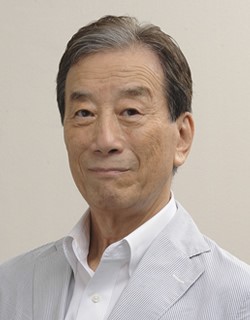 Dr. Kiyoshi Kurokawa is a graduate of the University of Tokyo Faculty of Medicine. From 1969 to 1984, he lived in the United States where he served as Professor of Internal Medicine at the University of California, Los Angeles (UCLA) School of Medicine. His other positions have included Professor of Internal Medicine, University of Tokyo; Dean, School of Medicine, Tokai University; President, Science Council of Japan (2003-2006); Member, Council for Science and Technology Policy, Cabinet Office (2003-2006); Special Advisor, Cabinet Office (2006-2008); and Commissioner, World Health Organization (WHO) (2005-2009). He also served as Chairman of the National Diet of Japan’s Fukushima Nuclear Accident Independent Investigation Commission (2011-2012), Chair and Representative Director of the Global Health Innovative Technology Fund (GHIT Fund) (2013-2018), and as Special Advisor on Health and Medical Strategy at the Cabinet Secretariat Headquarters for Healthcare and Medical Strategy Promotion (2013-2019). Dr. Kurokawa’s current positions include Vice Chair and Committee Member of the World Dementia Council (WDC) and Chairman of the Investigative Committee on AI Simulation for Coronavirus Disease 2019 Countermeasures. He has been named professor emeritus at the National Graduate Institute for Policy Studies (GRIPS) and the University of Tokyo and as a Distinguished Professor of Tokai University.
Dr. Kiyoshi Kurokawa is a graduate of the University of Tokyo Faculty of Medicine. From 1969 to 1984, he lived in the United States where he served as Professor of Internal Medicine at the University of California, Los Angeles (UCLA) School of Medicine. His other positions have included Professor of Internal Medicine, University of Tokyo; Dean, School of Medicine, Tokai University; President, Science Council of Japan (2003-2006); Member, Council for Science and Technology Policy, Cabinet Office (2003-2006); Special Advisor, Cabinet Office (2006-2008); and Commissioner, World Health Organization (WHO) (2005-2009). He also served as Chairman of the National Diet of Japan’s Fukushima Nuclear Accident Independent Investigation Commission (2011-2012), Chair and Representative Director of the Global Health Innovative Technology Fund (GHIT Fund) (2013-2018), and as Special Advisor on Health and Medical Strategy at the Cabinet Secretariat Headquarters for Healthcare and Medical Strategy Promotion (2013-2019). Dr. Kurokawa’s current positions include Vice Chair and Committee Member of the World Dementia Council (WDC) and Chairman of the Investigative Committee on AI Simulation for Coronavirus Disease 2019 Countermeasures. He has been named professor emeritus at the National Graduate Institute for Policy Studies (GRIPS) and the University of Tokyo and as a Distinguished Professor of Tokai University.
Ryoji Noritake (CEO and Board Member, HGPI)
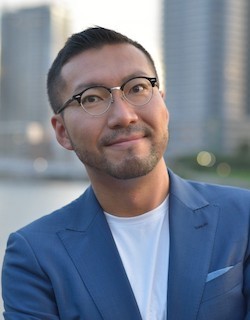 Mr. Ryoji Noritake is the CEO, and Board Member of Health and Global Policy Institute (HGPI), a Tokyo-based independent and non-profit health policy think tank established in 2004. He also served as Asia-Pacific Lead for Project HOPE, a US-based medical humanitarian aid organization. Through HOPE and HGPI, he has led health system strengthening projects in the Asia-Pacific region and engaged in the US Navy’s medical humanitarian projects. His focus is a multi-sectoral approach to health issues such as public-private partnerships and civil-military coordination. He was a member of the Tokyo Metropolitan Government’s Policy Discussion Roundtable for Super Ageing Society (2018) and served as a Visiting Scholar at the National Graduate Institute for Policy Studies (2016-2020). He is currently serving as a member of World Dementia Council (WDC), the Salzburg Global Seminar’s Advisory Council, Advisory Board Member of Elsevier Atlas, and the Dementia Innovation Alliance hosted by the Ministry of Economy, Trade and Industry (METI), Japan. He was awarded the 32th Takemi Incentive Award in 2022. He is a graduate of Keio University’s Faculty of Policy Management and holds a MSc in Medical Anthropology from the University of Amsterdam, the Netherlands.
Mr. Ryoji Noritake is the CEO, and Board Member of Health and Global Policy Institute (HGPI), a Tokyo-based independent and non-profit health policy think tank established in 2004. He also served as Asia-Pacific Lead for Project HOPE, a US-based medical humanitarian aid organization. Through HOPE and HGPI, he has led health system strengthening projects in the Asia-Pacific region and engaged in the US Navy’s medical humanitarian projects. His focus is a multi-sectoral approach to health issues such as public-private partnerships and civil-military coordination. He was a member of the Tokyo Metropolitan Government’s Policy Discussion Roundtable for Super Ageing Society (2018) and served as a Visiting Scholar at the National Graduate Institute for Policy Studies (2016-2020). He is currently serving as a member of World Dementia Council (WDC), the Salzburg Global Seminar’s Advisory Council, Advisory Board Member of Elsevier Atlas, and the Dementia Innovation Alliance hosted by the Ministry of Economy, Trade and Industry (METI), Japan. He was awarded the 32th Takemi Incentive Award in 2022. He is a graduate of Keio University’s Faculty of Policy Management and holds a MSc in Medical Anthropology from the University of Amsterdam, the Netherlands.
Eri Yoshimura (Senior Manager, HGPI)
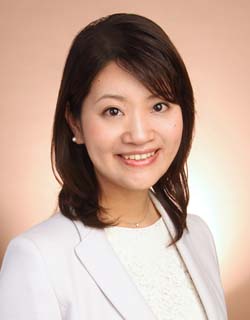 Originally from Kagoshima Prefecture. Eri Yoshimura graduated from Keio University with a BA in Law (Political Science). After graduating, she started her career at a Japanese medical device company. She then worked as a strategy consultant at a US based IT company in Japan. She provided global logistics consulting services for Japanese manufacturing companies in areas such as business process standardization and supply chain transformation. As a Rotary Foundation Global Scholar, she graduated from the University of California, San Francisco (UCSF) with a MS in Global Health. During her masters at UCSF, Eri focused on maternal and child health, and conducted field work in Sulawesi, Indonesia. After graduating from UCSF, she joined Health and Global Policy Institute (HGPI) in 2016. Eri led global health related projects including Access to Medicine and Antimicrobial Resistance. She has also planned and managed several projects on dementia, such as promoting public-private-partnerships in dementia and collaborating with the World Dementia Council (WDC) in research. Eri additionally plans, manages, and implements health policy related projects in Kanagawa Prefecture and is also engaged with global educational programs for future public health leaders.
Originally from Kagoshima Prefecture. Eri Yoshimura graduated from Keio University with a BA in Law (Political Science). After graduating, she started her career at a Japanese medical device company. She then worked as a strategy consultant at a US based IT company in Japan. She provided global logistics consulting services for Japanese manufacturing companies in areas such as business process standardization and supply chain transformation. As a Rotary Foundation Global Scholar, she graduated from the University of California, San Francisco (UCSF) with a MS in Global Health. During her masters at UCSF, Eri focused on maternal and child health, and conducted field work in Sulawesi, Indonesia. After graduating from UCSF, she joined Health and Global Policy Institute (HGPI) in 2016. Eri led global health related projects including Access to Medicine and Antimicrobial Resistance. She has also planned and managed several projects on dementia, such as promoting public-private-partnerships in dementia and collaborating with the World Dementia Council (WDC) in research. Eri additionally plans, manages, and implements health policy related projects in Kanagawa Prefecture and is also engaged with global educational programs for future public health leaders.
Top Research & Recommendations Posts
- [Policy Recommendations] The Path to a Sustainable Healthcare System: Three Key Objectives for Public Deliberation (January 22, 2026)
- [Research Report] The 2025 Public Opinion Survey on Healthcare in Japan (March 17, 2025)
- [Research Report] Perceptions, Knowledge, Actions and Perspectives of Healthcare Organizations in Japan in Relation to Climate Change and Health: A Cross-Sectional Study (November 13, 2025)
- [Policy Recommendations] Reshaping Japan’s Immunization Policy for Life Course Coverage and Vaccine Equity: Challenges and Prospects for an Era of Prevention and Health Promotion (April 25, 2025)
- [Research Report] The 2023 Public Opinion Survey on Satisfaction in Healthcare in Japan and Healthcare Applications of Generative AI (January 11, 2024)
- [Research Report] AMR Policy Update #4: Cancer Care and AMR (Part 1)
- [Public Comment Submission] “Assessment Report on Climate Change Impacts in Japan (Draft Overview)” (December 24, 2025)
- [Policy Recommendations] Developing a National Health and Climate Strategy for Japan (June 26, 2024)
- [Research Report] The Public Opinion Survey on Child-Rearing in Modern Japan (Final Report) (March 4, 2022)
- [Research Report] Survey of Japanese Physicians Regarding Climate Change and Health (December 3, 2023)
Featured Posts
-
2026-01-09
[Registration Open] (Hybrid Format) Dementia Project FY2025 Initiative Concluding Symposium “The Future of Dementia Policy Surrounding Families and Others Who Care for People with Dementia” (March 9, 2026)
![[Registration Open] (Hybrid Format) Dementia Project FY2025 Initiative Concluding Symposium “The Future of Dementia Policy Surrounding Families and Others Who Care for People with Dementia” (March 9, 2026)](https://hgpi.org/en/wp-content/uploads/sites/2/dementia-20260309-top.png)
-
2026-02-05
[Registration Open] (Webinar) The 141st HGPI Seminar “Current Status and Future Prospects of Korea’s Obesity Policy: Voices of People with Lived Experience in Policy Promotion” (March 3, 2026)
![[Registration Open] (Webinar) The 141st HGPI Seminar “Current Status and Future Prospects of Korea’s Obesity Policy: Voices of People with Lived Experience in Policy Promotion” (March 3, 2026)](https://hgpi.org/en/wp-content/uploads/sites/2/hs141-top-1.png)
-
2026-02-06
[Research Report] AMR Policy Update #5: Cancer Care and AMR (Part 2)
![[Research Report] AMR Policy Update #5: Cancer Care and AMR (Part 2)](https://hgpi.org/en/wp-content/uploads/sites/2/HGPI_20260204_AMR-Policy-Update-5.png)




